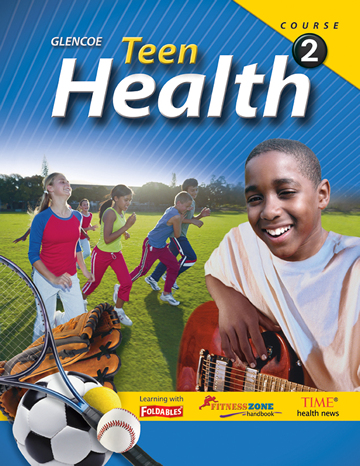Teen Health Course 2Chapter 11:
Personal Health and Consumer ChoicesStudent Web Activities - Teacher ContentLesson 1 Answers - Close to 100% of people between the ages of twelve and seventeen have at least an occasional whitehead, blackhead or pimple, regardless of race or ethnicity.
- No, acne is not caused by poor hygiene, and washing your face too much can make the acne worse.
- With the products available today, there is no reason why someone has to endure acne or get acne scars.
- A teen should consider seeing a dermatologist when:
- Acne is making him/her shy
- Acne is embarrassing him/her
- His or her outlook on life is less optimistic since he/she developed acne.
- None of the over-the-counter products or remedies worked.
- There are scars left after acne lesions clear.
- He or she has painful, pus-filled lesions in addition to blackheads, whiteheads, and red spots on the skin.
- He or she has dark skin, and a dark patch appears when an acne lesion clears.
- The seven tips for taking care of acne are:
- Do NOT pop, squeeze or pick at acne.
- Gently wash your face twice a day with a mild cleanser and pat dry.
- Use "noncomedogenic" (does not clog pores) cosmetics and toiletries.
- Avoid aggravating your acne.
- Give acne products enough time to do their job.
- Use medications as directed.
- Avoid excess exposure to sunlight, and do not use tanning booths or sun lamps.
Additional Resources for Teachers Below are some additional resources on acne and its treatment. You might want to take a survey of your students to see which over the counter products they have found helpful. - ACNE.com: http://www.acne.com/
- ACNE.org: http://www.acne.org/
- Teens Health: http://kidshealth.org/teen/your_body/skin_stuff/acne_myths.html
- Acne Scars: http://kidshealth.org/teen/your_body/skin_stuff/acne_scars.html
Lesson 2 Answers - Experts recommend earplugs when exposed to sounds at 85 dB (decibels) and above.
- Average traffic (85); MRI (95); blow dryer, subway train (100); power mower, chain saw (105); screaming child (110); rock concert, thunderclap (120), jackhammer, jet engine (130).
- Noise-induced hearing loss can be caused by a one-time exposure to a loud sound or by repeated exposure to sounds over an extended period of time.
- Some precautions you can take to protect your hearing include:
- Walk away from loud noises.
- Turn down the volume.
- Limit the intensity of the noise by not standing directly near its source.
- Limit the time you expose your ears to loud noises.
- Wear earplugs when you're around sounds of 85 dB and above. (Disposable foam earplugs are inexpensive, easy to insert and effective.)
- Turn down your CD/cassette player, stereo or iPod.
- Cross the street when you hear someone operating a leaf blower.
- Wear earplugs at concerts/go to the back of the nightclub or outside to give your ears a break.
- Cover your ears with your hands when you're walking past a jackhammer.
- The lyrics by Beck speak of a ship of noise, resulting in confused instincts, perhaps a loss of balance caused by hearing damage, and he compares the feeling to "blown-out speakers" and ringing in his ears.
Additional Resources for Teachers Below are some additional resources on hearing and how to prevent hearing loss. - FDA – On the Teen Scene: http://www.fda.gov/fdac/reprints/ots_ears.html
- University of Iowa: http://www.uihealthcare.com/topics/hearing/hear4689.html
- Lower the Boom: http://www.lowertheboom.org/links/h17_teen_hearing_loss.html
 | 
















